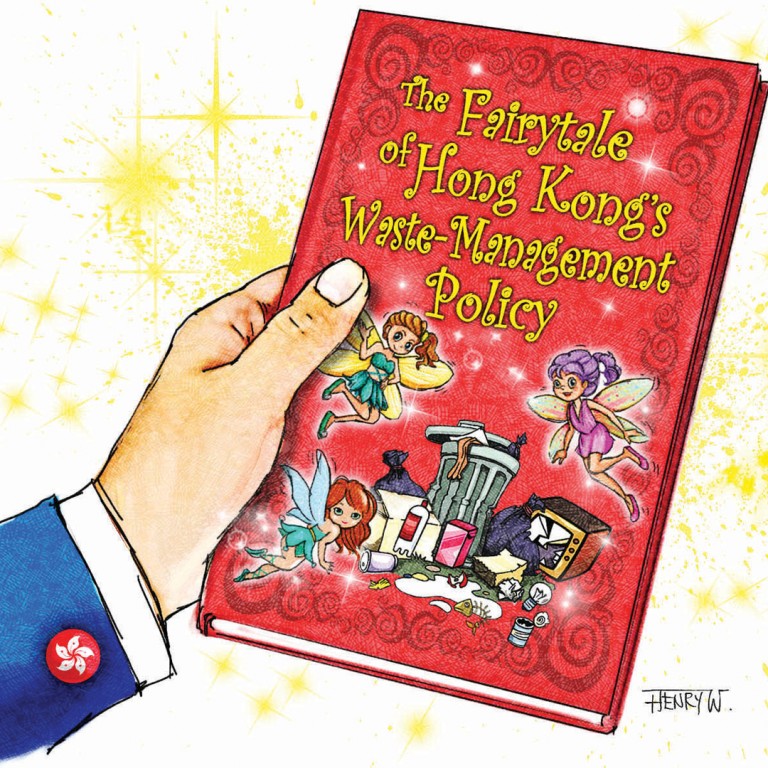
Hong Kong's plan to reduce its waste enters the realm of fantasy
Tom Yam says the government's plan to reduce our waste through charging - while doing little to encourage recovery and recycling - is based on wishful thinking and won't be realised
Here's a tip for delegates coming to Hong Kong for an international conference on solid waste: skip our environment secretary's keynote address. Go to Disneyland instead. You'll be immersed in Fantasyland either way, but you'll have more fun with Mickey Mouse than Wong Kam-sing.
Wong is expected to recite his "Hong Kong Blueprint for Sustainable Use of Resources 2013-2022". The part on waste management is as fantastical as Space Mountain, but minus the thrills. To reduce Hong Kong's Waste Mountain, the Environment Bureau's goal is to cut by 40 per cent the amount of solid waste disposed of per capita, from 1.27kg per day in 2011 to 0.8kg in 2022 (no matter that the figure in fact increased to 1.33kg in 2013). The bureau insists this is achievable through charging us for the solid waste we produce, along with public education, and cites the success of South Korea and Taipei in shrinking their waste mountains.
But the bureau is wishing upon a star. A waste-reduction policy based on reality, rather than wishful thinking, has to follow an inescapable equation: waste disposed is equal to waste generated, minus waste recovered for recycling. Waste charging can reduce the amount of waste generated. But equally essential is increasing the amount of waste recovered and recycled. After introducing waste charging, South Korea reduced the waste it generated by 23 per cent, and increased the waste it recovered from 24 per cent to 60 per cent. Taipei reduced the waste it generated by 62 per cent, and increased the waste it recycled to 60 per cent. The combined effect of generating less garbage and recovering more of it for recycling is necessary in reducing the amount of waste that needs disposing of.
A further reality that the bureau wilfully ignores is that waste recovery and recycling is impossible without a mandatory, systematic programme of waste separation. Recyclable waste, such as paper, metal, glass and plastic, needs to be handled separately from waste that ends up in landfills or the incinerator. Such a programme cannot be enforced without legislation. Taiwan has introduced such laws: a Waste Disposal Act and a Resource Recycling Act, which mandate comprehensive waste separation and recycling.
Similarly, South Korea introduced a Waste Control Act and an Act on Promotion of Saving and Recycling of Waste. It takes political will to push through such a statutory framework.
Key to recovering more waste is a recycling industry that can profitably process such waste into marketable products like recycled paper, glassware, plastic items and building materials. To support its recycling industry, Taiwan has an annual recycling fund of NT$6 billion (HK$1.5 billion ). It has become a leading developer of recycling technology. In South Korea, a government-sponsored Korea Environmental Corporation provides financial assistance to the recycling industry, resulting in a substantial increase in the number of recycling companies in the country.
Hong Kong's pitiable recycling industry does not have the scale or infrastructure to process recovered waste into marketable products. For starters, 93 per cent of recovered waste is exported for sale, mostly to the mainland. In 2003, the government designated an EcoPark for a high-tech, high-value-added recycling industry. Yet the industry remains stuck at the lowest level of operations: collection, recovery and export of waste paper, metal, plastic, etc, activities with low economic value.
Relying on exporting also exposes the industry to external vagaries. During the global financial crisis in 2008, for instance, the purchase price of waste paper in Hong Kong plummeted from HK$2,000 to HK$700 per tonne. In 2013, when mainland authorities tightened regulations for importing recovered plastics, 100,000 tonnes of plastic waste piled up at collection points.
Without serious and sustained separation of waste to increase the waste recovered, the amount of recyclables is simply insufficient to support the development of a recycling industry. Relying on export, the industry will dwindle as waste exporting options continue to decrease, limiting the amount of recyclable waste that exporters want to recover profitably.
The government has made no serious effort to create an indigenous recycling industry. A one-off HK$1 billion fund proposed to support recycling companies essentially only subsidises local companies to recover more waste for export. HK$1 billion sounds like a lot but it's measly compared to the HK$19 billion budgeted for building an incinerator, HK$10 billion for expanding landfills, and HK$8 billion for a sludge treatment facility. In 2011-2012, the budget dedicated to education, publicity and advertisement of recycling was only HK$24 million. The allocation of funding reveals the priority: building waste-disposal capacity, not recycling.
Scattered recycling pilot projects are being tried in some housing estates but none have resulted in a territory-wide programme. The tri-colour recycling bins on the streets collect only 700 tonnes of recyclable waste a year, a mere fraction of the waste generated in Hong Kong. Yet the bureau claims it will increase the rate of recovery from 37 per cent of waste generated in 2013 to 55 per cent by 2022.
While the government looks to waste charging in reducing the waste generated, it ignores the other side of the equation: waste separation mandated by legislation and the creation of a viable recycling industry. Yet without these essential components, it aspires to achieve in seven years from now what Taipei took more than a decade to accomplish. There's a Disney attraction analogous to that aspiration; it's called The Mad Hatter's Tea Party.

